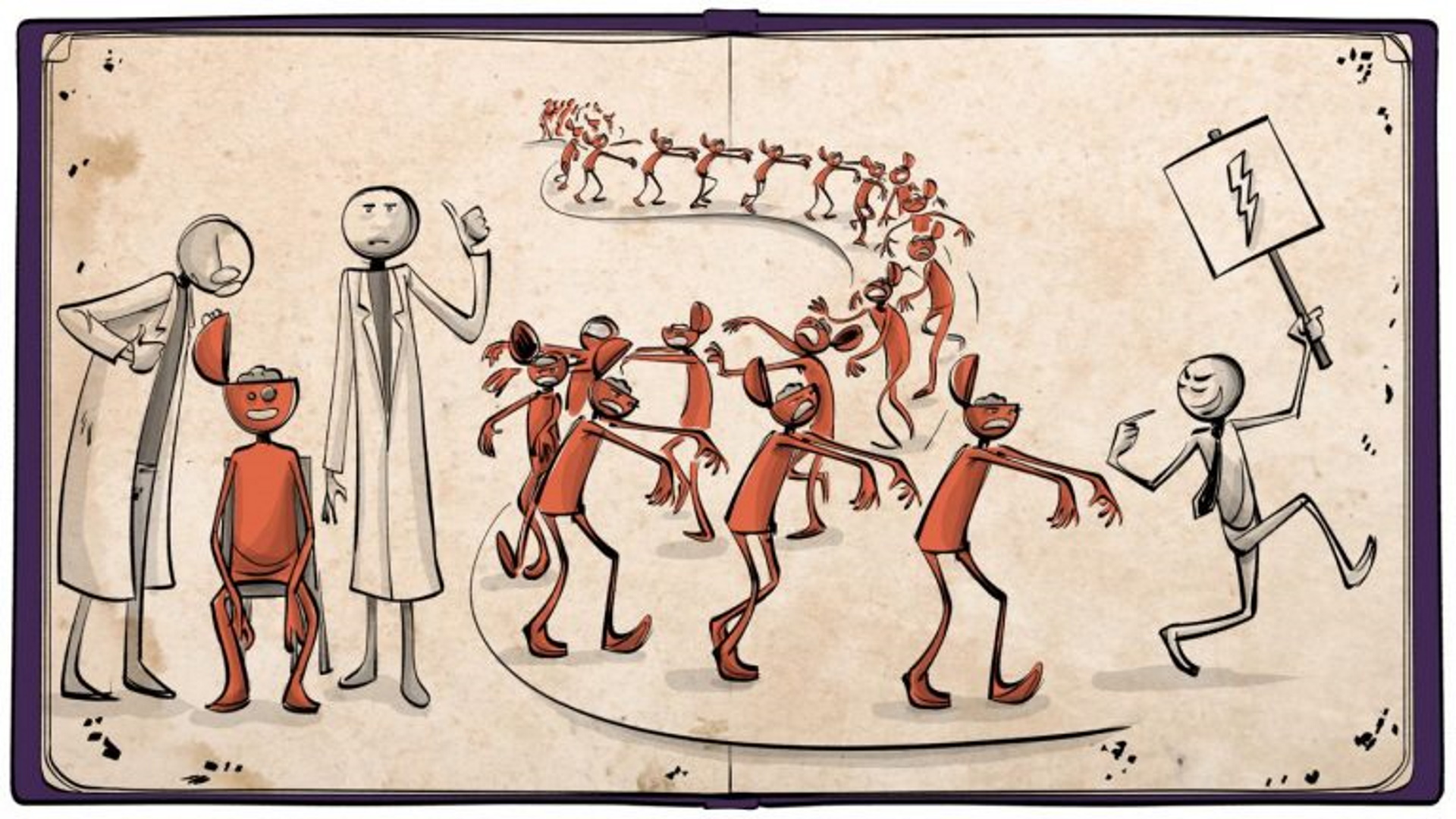
Bonhoeffer’s Theory of Stupidity
by Jonas Koblin, Sprouts
originally published October 19, 2021
Dietrich Bonhoeffer argued that stupid people are more dangerous than evil ones. This is because while we can protest against or fight evil people, against stupid ones we are defenseless — reasons fall on deaf ears. Bonhoeffer’s famous text, which we slightly edited for this video, serves any free society as a warning of what can happen when certain people gain too much power.
The Full Story
In the darkest chapter of German history, during a time when incited mobs threw stones into the windows of innocent shop owners and women and children were cruelly humiliated in the open; Dietrich Bonhoeffer, a young pastor, began to speak publicly against the atrocities.
After years of trying to change people’s minds, Bonhoeffer came home one evening and his own father had to tell him that two men were waiting in his room to take him away.
In prison, Bonhoeffer began to reflect on how his country of poets and thinkers had turned into a collective of cowards, crooks and criminals. Eventually he concluded that the root of the problem was not malice, but stupidity.
Bonhoeffer’s Letters From Prison
In his famous letters from prison, Bonhoeffer argued that stupidity is a more dangerous enemy of the good than malice, because while “one may protest against evil; it can be exposed and prevented by the use of force, against stupidity we are defenseless. Neither protests nor the use of force accomplish anything here. Reasons fall on deaf ears.”
Facts that contradict a stupid person’s prejudgment simply need not be believed and when they are irrefutable, they are just pushed aside as inconsequential, as incidental. In all this, the stupid person is self-satisfied and, being easily irritated, becomes dangerous by going on the attack.
For that reason, greater caution is called for when dealing with a stupid person than with a malicious one. If we want to know how to get the better of stupidity, we must seek to understand its nature.
This much is certain, stupidity is in essence not an intellectual defect but a moral one. There are human beings who are remarkably agile intellectually yet stupid, and others who are intellectually dull yet anything but stupid.
The impression one gains is not so much that stupidity is a congenital defect but that, under certain circumstances, people are made stupid or rather, they allow this to happen to them.
People who live in solitude manifest this defect less frequently than individuals in groups. And so it would seem that stupidity is perhaps less a psychological than a sociological problem.
It becomes apparent that every strong upsurge of power, be it of a political or religious nature, infects a large part of humankind with stupidity. Almost as if this is a sociological-psychological law where the power of the one needs the stupidity of the other.
The process at work here is not that particular human capacities, such as intellect, suddenly fail. Instead, it seems that under the overwhelming impact of rising power, humans are deprived of their inner independence and, more or less consciously, give up an autonomous position.
The fact that the stupid person is often stubborn must not blind us from the fact that he is not independent. In conversation with him, one virtually feels that one is dealing not at all with him as a person, but with slogans, catchwords, and the like that have taken possession of him.
He is under a spell, blinded, misused, and is abused in his very being. Having thus become a mindless tool, the stupid person will also be capable of any evil – incapable of seeing that it is evil.
Only an act of liberation, not instruction, can overcome stupidity. Here we must come to terms with the fact that in most cases a genuine internal liberation becomes possible only when external liberation has preceded it. Until then, we must abandon all attempts to convince the stupid person.
Dietrich Bonhoeffer
Bonhoeffer died due to his involvement in a plot against Adolf Hitler at dawn on 9 April 1945 at Flossenbürg concentration camp just two weeks before soldiers from the United States liberated the camp.
“Action springs not from thought, but from a readiness for responsibility. The ultimate test of a moral society is the kind of world that it leaves to its children.” Bonhoeffer once said.
Check the sources below to read Bonhoeffer’s original text, “After Ten Years”
- Dietrich Bonhoeffer – Wikipedia
- Bonhoeffer on Stupidity – After Ten Years
- Bonhoeffer’s Arrest
- Dietrich Bonhoeffer’s Final Words – This Day in History
- Dietrich Bonhoeffer Quotes
cover image credit: Sprouts

Truth Comes to Light highlights writers and video creators who ask the difficult questions while sharing their unique insights and visions.
Everything posted on this site is done in the spirit of conversation. Please do your own research and trust yourself when reading and giving consideration to anything that appears here or anywhere else.










